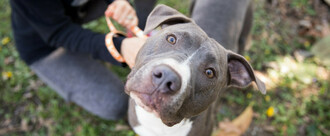-
End Breed-Restrictive Insurance Practices in ColoradoThere is a wide range of dogs falling within the category of “risk” breeds according to some insurance companies including Boxers, Giant Schnauzers, German Shepherds, Chows, Great Danes, Alaskan Malamutes, American Staffordshire Terriers, Akitas, Cane Corsos, American Bulldogs, Belgian Malinois, Keeshonds, Rhodesian Ridgebacks, Ovtcharkas, Siberian Huskies, Dobermans, Pit Bulls, Dalmatians, Rottweilers, Australian Cattle dogs and more. The National Association of Insurance Commissioners [NAIC] should protect pet-owning consumers. Insurance companies should focus on the behavior of the dog. Dogs with aggressive behavior should not be protected by any moratorium. This is important because dogs are viewed by the vast majority of Americans as part of the family, and the ability for people to keep families together should be protected. Breed-restrictive insurance practices can force responsible pet owners to give up their pets and increase the number of pets in shelters. The likelihood a dog will bite is based on many factors such as socialization of the dog, obedience training, supervision provided by the owner, and how the victim interacts with the dog. It has not been proven by scientific evidence that aggressive behavior is present in any particular breed of dog. Insurance companies that want to reduce risk should focus solely on behavior of the dog and the behavior of the owner.384 of 400 Signatures
-
End Breed-Restrictive Insurance Practices in AlabamaThere is a wide range of dogs falling within the category of “risk” breeds according to some insurance companies including Boxers, Giant Schnauzers, German Shepherds, Chows, Great Danes, Alaskan Malamutes, American Staffordshire Terriers, Akitas, Cane Corsos, American Bulldogs, Belgian Malinois, Keeshonds, Rhodesian Ridgebacks, Ovtcharkas, Siberian Huskies, Dobermans, Pit Bulls, Dalmatians, Rottweilers, Australian Cattle dogs and more. The National Association of Insurance Commissioners [NAIC] should protect pet-owning consumers. Insurance companies should focus on the behavior of the dog. Dogs with aggressive behavior should not be protected by any moratorium. This is important because dogs are viewed by the vast majority of Americans as part of the family, and the ability for people to keep families together should be protected. Breed-restrictive insurance practices can force responsible pet owners to give up their pets and increase the number of pets in shelters. The likelihood a dog will bite is based on many factors such as socialization of the dog, obedience training, supervision provided by the owner, and how the victim interacts with the dog. It has not been proven by scientific evidence that aggressive behavior is present in any particular breed of dog. Insurance companies that want to reduce risk should focus solely on behavior of the dog and the behavior of the owner.253 of 300 Signatures
-
End Breed-Restrictive Insurance Practices in ConnecticutThere is a wide range of dogs falling within the category of “risk” breeds according to some insurance companies including Boxers, Giant Schnauzers, German Shepherds, Chows, Great Danes, Alaskan Malamutes, American Staffordshire Terriers, Akitas, Cane Corsos, American Bulldogs, Belgian Malinois, Keeshonds, Rhodesian Ridgebacks, Ovtcharkas, Siberian Huskies, Dobermans, Pit Bulls, Dalmatians, Rottweilers, Australian Cattle dogs and more. The National Association of Insurance Commissioners [NAIC] should protect pet-owning consumers. Insurance companies should focus on the behavior of the dog. Dogs with aggressive behavior should not be protected by any moratorium. This is important because dogs are viewed by the vast majority of Americans as part of the family, and the ability for people to keep families together should be protected. Breed-restrictive insurance practices can force responsible pet owners to give up their pets and increase the number of pets in shelters. The likelihood a dog will bite is based on many factors such as socialization of the dog, obedience training, supervision provided by the owner, and how the victim interacts with the dog. It has not been proven by scientific evidence that aggressive behavior is present in any particular breed of dog. Insurance companies that want to reduce risk should focus solely on behavior of the dog and the behavior of the owner.328 of 400 Signatures
-
End Breed-Restrictive Insurance Practices in ArizonaThere is a wide range of dogs falling within the category of “risk” breeds according to some insurance companies including Boxers, Giant Schnauzers, German Shepherds, Chows, Great Danes, Alaskan Malamutes, American Staffordshire Terriers, Akitas, Cane Corsos, American Bulldogs, Belgian Malinois, Keeshonds, Rhodesian Ridgebacks, Ovtcharkas, Siberian Huskies, Dobermans, Pit Bulls, Dalmatians, Rottweilers, Australian Cattle dogs and more. The National Association of Insurance Commissioners [NAIC] should protect pet-owning consumers. Insurance companies should focus on the behavior of the dog. Dogs with aggressive behavior should not be protected by any moratorium. This is important because dogs are viewed by the vast majority of Americans as part of the family, and the ability for people to keep families together should be protected. Breed-restrictive insurance practices can force responsible pet owners to give up their pets and increase the number of pets in shelters. The likelihood a dog will bite is based on many factors such as socialization of the dog, obedience training, supervision provided by the owner, and how the victim interacts with the dog. It has not been proven by scientific evidence that aggressive behavior is present in any particular breed of dog. Insurance companies that want to reduce risk should focus solely on behavior of the dog and the behavior of the owner.773 of 800 Signatures
-
End Breed-Restrictive Insurance Practices in AlaskaThere is a wide range of dogs falling within the category of “risk” breeds according to some insurance companies including Boxers, Giant Schnauzers, German Shepherds, Chows, Great Danes, Alaskan Malamutes, American Staffordshire Terriers, Akitas, Cane Corsos, American Bulldogs, Belgian Malinois, Keeshonds, Rhodesian Ridgebacks, Ovtcharkas, Siberian Huskies, Dobermans, Pit Bulls, Dalmatians, Rottweilers, Australian Cattle dogs and more. The National Association of Insurance Commissioners [NAIC] should protect pet-owning consumers. Insurance companies should focus on the behavior of the dog. Dogs with aggressive behavior should not be protected by any moratorium. This is important because dogs are viewed by the vast majority of Americans as part of the family, and the ability for people to keep families together should be protected. Breed-restrictive insurance practices can force responsible pet owners to give up their pets and increase the number of pets in shelters. The likelihood a dog will bite is based on many factors such as socialization of the dog, obedience training, supervision provided by the owner, and how the victim interacts with the dog. It has not been proven by scientific evidence that aggressive behavior is present in any particular breed of dog. Insurance companies that want to reduce risk should focus solely on behavior of the dog and the behavior of the owner.112 of 200 Signatures
-
End Breed-Restrictive Insurance Practices in ArkansasThere is a wide range of dogs falling within the category of “risk” breeds according to some insurance companies including Boxers, Giant Schnauzers, German Shepherds, Chows, Great Danes, Alaskan Malamutes, American Staffordshire Terriers, Akitas, Cane Corsos, American Bulldogs, Belgian Malinois, Keeshonds, Rhodesian Ridgebacks, Ovtcharkas, Siberian Huskies, Dobermans, Pit Bulls, Dalmatians, Rottweilers, Australian Cattle dogs and more. The National Association of Insurance Commissioners [NAIC] should protect pet-owning consumers. Insurance companies should focus on the behavior of the dog. Dogs with aggressive behavior should not be protected by any moratorium. This is important because dogs are viewed by the vast majority of Americans as part of the family, and the ability for people to keep families together should be protected. Breed-restrictive insurance practices can force responsible pet owners to give up their pets and increase the number of pets in shelters. The likelihood a dog will bite is based on many factors such as socialization of the dog, obedience training, supervision provided by the owner, and how the victim interacts with the dog. It has not been proven by scientific evidence that aggressive behavior is present in any particular breed of dog. Insurance companies that want to reduce risk should focus solely on behavior of the dog and the behavior of the owner.199 of 200 Signatures
-
End Breed-Restrictive Insurance Practices in LouisianaThere is a wide range of dogs falling within the category of “risk” breeds according to some insurance companies including Boxers, Giant Schnauzers, German Shepherds, Chows, Great Danes, Alaskan Malamutes, American Staffordshire Terriers, Akitas, Cane Corsos, American Bulldogs, Belgian Malinois, Keeshonds, Rhodesian Ridgebacks, Ovtcharkas, Siberian Huskies, Dobermans, Pit Bulls, Dalmatians, Rottweilers, Australian Cattle dogs and more. The National Association of Insurance Commissioners [NAIC] should protect pet-owning consumers. Insurance companies should focus on the behavior of the dog. Dogs with aggressive behavior should not be protected by any moratorium. This is important because dogs are viewed by the vast majority of Americans as part of the family, and the ability for people to keep families together should be protected. Breed-restrictive insurance practices can force responsible pet owners to give up their pets and increase the number of pets in shelters. The likelihood a dog will bite is based on many factors such as socialization of the dog, obedience training, supervision provided by the owner, and how the victim interacts with the dog. It has not been proven by scientific evidence that aggressive behavior is present in any particular breed of dog. Insurance companies that want to reduce risk should focus solely on behavior of the dog and the behavior of the owner.210 of 300 Signatures
-
Stop allowing dogs to ride in the beds of pickup trucksBecause it saves dogs lives and encourages responsibility!! Numerous times I have seen dogs "hanging" over the sides of pickup beds, dangerously close to falling out. My sister told me that once she had actually seen a tethered dog fall out and get hung. I have seen numerous dead dogs on the sides of freeways and the only way this could happen is if they had fallen out of a pickup truck bed. That many loose dogs would not wander onto a freeway. People need to be less cavalier and more careful with their supposed treasured pets.267 of 300 SignaturesCreated by Sandy B.
-
Tell insurance companies to stop discriminating against dog breedsTwo-thirds of American households include at least one cat or dog, which makes having a pet-inclusive place to call home essential for most Americans. Given the huge demand, one might think there would be enough pet-inclusive housing for renters. Unfortunately, housing-related issues are the second most common reason that families surrender a pet to an animal shelter. These housing issues may pertain to insurance issues, landlord restrictions, or limitations placed on the physical animal. Many rental and government-subsidized housing make it difficult to own a pet. Even properties that are "pet-friendly" might have pet weight limits, such as "no dogs over 25 lbs" or breed restrictions. When families are forced to choose between securing a place to live and keeping their family pets, they may see surrender as a last resort. As a trillion-dollar industry, the housing sector can be a positive influence in creating an inclusive and humane community. Additionally, more than 90% of housing providers and residents agree that pets are an important part of families. Welcoming all pets is good for business because residents stay significantly longer in housing that is pet inclusive (2). Expanding affordable and accessible pet-inclusive housing is necessary to ensure that families don’t have to choose between housing and valued members of their family. Let’s work together to end housing restrictions for pets and their families.206 of 300 SignaturesCreated by Stacey S.
-
No corten los fondos de nuestro refugioEl programa de vales proporciona a los miembros de la comunidad local y las mascotas los recursos que tanto necesitan. También reduce la cantidad de animales que ingresan al refugio y también disminuye la cantidad de mascotas que matan por esa razón. A través de este programa, los miembros de la comunidad de Midland tienen acceso a esterilización / castración asequible para sus perros y gatos. Esto les permite conservar la propiedad de sus mascotas mientras brindan atención médica y, en última instancia, mantienen baja la población animal callejera. Cortar estos fondos limita drásticamente las opciones para manejar poblaciones de animales callejeros en Midland, TX. Esto podría llevar a un aumento en la ingesta de refugios creando condiciones de hacinamiento y mayores tasas de eutanasia. Esto afectaría al personal del refugio y a los residentes locales que ya no tendrían acceso a los recursos para ayudar a crear soluciones a nivel comunitario.47 of 100 SignaturesCreated by Carol R.

-
Apoya a las mascotas y a la gente de OdessaA veces, cuando desea generar un cambio en su comunidad, es difícil saber por dónde empezar. Trabajamos con defensores locales como usted para realizar cambios sostenibles que salven vidas mientras creamos un marco de apoyo para las mascotas de Odessa y las personas que se preocupan por ellas. Al unirse, se convierte en parte de un grupo motivado de personas que creen que todas las mascotas y las personas merecen compasión y que, cuando trabajamos juntos, podemos crear un cambio real para los perros y gatos necesitados.42 of 100 SignaturesCreated by Carol R.

-
Dime of DogsPeople lose their homes for having certain breeds of dogs. Some of these dogs have to go to homes where they aren’t properly cared for. It’s important to understand that it isn’t the breed of dog that makes it vicious, it’s the owner. Just like children, all dogs are born into this world only learning what is taught to them. Dogs suffer too. They have no voice & can’t speak for themselves. It’s also important to realize that if the dog is in a loving home, that he or she is in a safe environment. People shouldn’t have to be discriminated against, because of their preference of dog. We should be able to live in peace with our beloved animals without fear of “conditioned leasing” and eviction.153 of 200 SignaturesCreated by Kisha R.












